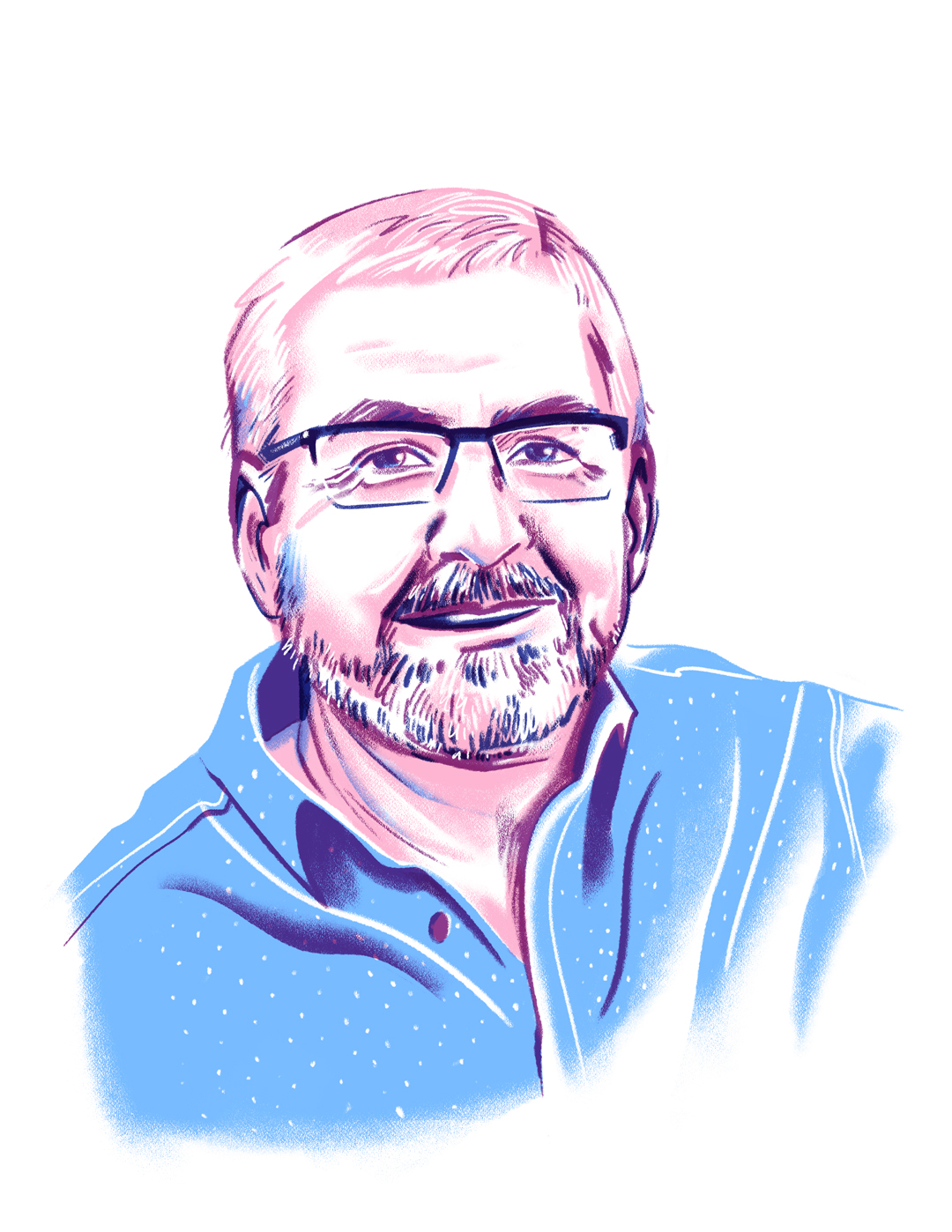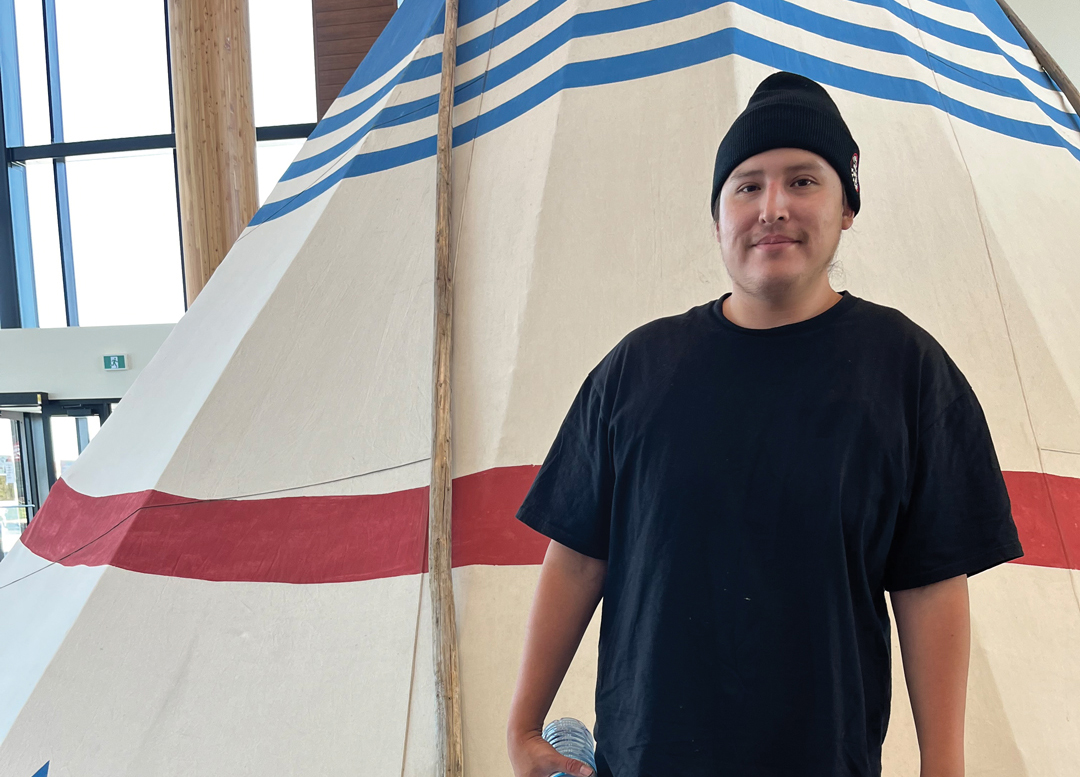THE ANSWER MAN
BY ELLEN COTTEE • ILLUSTRATION BY EMILY CHU
Established by the Government of Alberta in 1973 to help farmers protect their rights in dealings with the booming oil and gas industry of the day, the Farmers’ Advocate Office (FAO) has been greatly expanded from its original mandate. The office later merged with the Property Rights Advocate office and is now known as the Farmers’ and Property Rights Advocate Offices (FPRAO). Its modest team supports farmers and ranchers as they navigate a range of regulatory, environmental and legal issues.
Now in its 50th year of operation, the organization’s lead role is held by Peter Dobbie. The University of Alberta educated lawyer relocated from Edmonton to Vegreville in the early ’90s where he worked with a law firm until he joined the FAO in 2012. Though he had only minimal farm experience in his youth and happens to be allergic to most livestock, Dobbie has become the respected face of this indispensable and nationally unique agricultural agency.
GrainsWest: How did you transition from a career in law to your role as Alberta farmers’ advocate, and how does your law background help you in this position?
Peter Dobbie: I always say it’s my wife’s fault I have the job. She said, “Hey, take a look at this ad for the Farmers’ Advocate. It seems like it’s right up your alley.” She was right. I’m the first lawyer who has filled this role. And that’s been helpful for the team to be able to quickly get answers and insight into problems, rather than trying to get information and explanations through Alberta Justice. It’s a little tougher to get an opinion from a big organization.
GW: What kind of issues cross your desk, and how do you deal with them?
PD: A big part of what we do is mediation, because almost all phone calls start with someone being unhappy. We are often sweeping the road of frustrations for farmers and ranchers. Knowing you have a right to a remedy is one thing, but getting there can be difficult and frustrating.
A common area where problems arise is in the interaction between municipal governments and/or the provincial government and farm operations. There might be new construction, issues with water or changes in municipal bylaws that affect the ability of farmers and ranchers to develop or carry out certain operations. One example is changes in land use planning. As municipalities grow, they get closer and closer to farmland. The new rules often restrict the type of activity that the farm can do, and we are able to help farmers and ranchers navigate the ins and outs of the problem and the process to find a solution. We also create farm advisories based on trends we see, which helps them prepare for problems they could face and handle themselves if they want to.
GW: What do your duties as Alberta’s Property Rights Advocate entail?
PD: That office came into place in December 2012 I worked with the previous incumbents directly before taking the role in 2020. For the most part, I monitor issues as they arise. Team members say, “Hey, what should we do? What can we do?” In many cases I will be able to give them a legal answer. If you don’t know the law or have experience in this area, it can be complicated to figure out. I can provide direct action advice regarding the rules and what we should recommend to the landowner. If it looks like it has broader implications I will assess if a farm advisory is necessary so others can be aware. I deal with the new files, files that require additional advice or where someone simply wants to hear from the boss. It’s a similar process to the farmers’ advocate role.
GW: What is it like to work with the Government of Alberta?
PD: I spend a lot of time talking with MLAs and ministers. In many cases, MLAs are living in the area, and they want to deal directly with the landowners and stay involved. They do not want to just hand the issues off. There is a genuine interest on the part of every MLA and minister of agriculture I have had the pleasure of working with. They really do want what’s best for the farmers and ranchers in their community.
GW: There is obviously a lot to juggle in this role. What characteristics does someone need to succeed in this position?
PD: It requires someone with a broad, diverse background. You don’t have to be an expert in farming. Farmers don’t need my advice on seeding, spraying, harvesting or any of that. They need help identifying issues that might affect them, and then either resolving those issues or trying to improve the system. Having someone who’s interested in problem solving is important. We like to get the team out to the site of the problem. It really helps you understand the issues, and it’s a gesture of respect. You also have to like working with people, and you have to understand that many times you’re dealing with someone who is frustrated. You must be able to get past that, not take it personally and to help them move past the complaint phase to the facts, issues and actions phases.
GW: How does the FPRAO team work together, and in what roles?
PD: We are a small but mighty team. There are only five of us [on the farming side]. To make sure people are specialized without working in a silo, we try to have everyone work across different files while focusing on what they’re best at. Our assistant advocate is a fully qualified negotiator and mediator. We also have an energy, utilities and policy specialist to lead on those files. Our direct contact for water-related issues [also handles] our communications effort, like annual reports and farm advisories. Farm implement and insurance appeals are complicated, so we have a team member who provides support directly to farmers, helping them in terms of all the data they need and supports during hearings. Finally, we have an administrative officer to handle and direct nearly every request, application or question we receive. We deal with a lot, and having this role means nothing falls through the cracks.
GW: Looking back on its 50-year history of helping farmers, what is the most important aspect of the FPRAO’s work?
PD: We don’t tell people we can’t help them. Almost always when they get hold of us, they’ve been trying to get help already. Even if it’s not something we can directly solve, we will provide support. We tend to not pass people along or shuffle them off to another office, we work actively with them while being respectful of their issues and their time. We’re the only office like this that continues to function in Canada. I’m really glad the Government of Alberta has, since 1973, put its money where its talk is and funded the FAO.
GW: What gives you satisfaction in this role?
PD: I’m lucky to have the job. We deal with problems that we did not create and we can rarely make worse. The benefit is that we can help farmers and ranchers at no additional cost to them. We cannot solve all the problems, but we really are able to be clear and responsive. We give advice and direction, as opposed to many people in government who are restricted from that. We really try to give nuanced, sophisticated advice that helps people get towards the resolution they want. It’s a really gratifying job, it’s an important job and it’s the best job in the province.







Comments